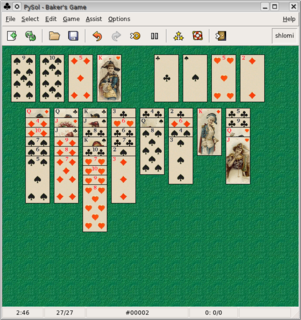
Games of patience, or (card) solitaires as they are usually called in North America, have their own 'language' of specialised terms such as "building down", "packing", "foundations", "talon" and "tableau". Once learnt they are helpful in describing, succinctly and accurately, how the games are played. Patience games are usually for a single player, although a small number have been designed for two and, in rare cases, three or even four players. They are games of skill or chance or a combination of the two. There are three classes of patience grouped by object.

Klondike, also known as Canfield, is a card game for one player and the best known and most popular version of the patience or solitaire family.

FreeCell is a solitaire card game played using the standard 52-card deck. It is fundamentally different from most solitaire games in that very few deals are unsolvable, and all cards are dealt face-up from the very beginning of the game. Although software implementations vary, most versions label the hands with a number.

Yukon is a type of patience or solitaire card game using a single deck of playing cards like Klondike, but there is no deck or stock, and manipulation of the tableau works differently.

Calculation is a solitaire card game played with a standard pack of 52 cards. It is part of the Sir Tommy family of patience games. It has its origin in France, where it is known as La Plus Belle.

Baker's Game is a patience or solitaire card game similar to FreeCell. It predates FreeCell, and differs from it only in the fact that sequences are built by suit, instead of by alternate color. This makes the game more difficult to complete successfully.
Eight Off is a patience or solitaire card game, named after its employment of eight cells, played with one deck of playing cards. The object of the game is to move all the cards into the foundations. It served as a partial inspiration for and is very similar to the popular solitaire game FreeCell.

Forty Thieves is a 2-deck patience or solitaire card game. It is quite difficult to win, and luck-of-the-draw is a significant factor.

Scorpion is a patience or solitaire card game using a deck of 52 playing cards. Although somewhat related to Spider, the method of game play is akin to Yukon. The object of this game is to form four columns of suit sequence cards from king down to ace.
Beleaguered Castle is a patience or solitaire card game played with a deck of 52 playing cards. It is sometimes described as "Freecell without cells" because its game play is somewhat akin to the popular solitaire computer game of that name but without extra empty spaces to maneuver. Beleaguered Castle is also called Laying Siege and Sham Battle.
Flower Garden is a solitaire card game using a deck of 52 playing cards, and is based on an old Japanese game. It is also known under the names The Bouquet and The Garden. The terms used in this game are related to gardening. Some skill is needed to successfully complete the game, and skilful players can win more than 20% of the time.
King Albert is a patience or card solitaire using a deck of 52 playing cards of the open packer type. It is a conventional building game, and is said to be named after Albert I of Belgium and is a variant of Somerset. It is the best known of the three games that are each called Idiot's Delight because of the low chance of winning the game.
Stonewall is a solitaire card game using a deck of 52 playing cards. It is probably thus named because the player seems to break down walls in exposing more of the face-down cards.
Red and Black is a solitaire card game which uses two decks of playing cards. The game is so called because all building is done in alternating colors of red and black. It is not related to another similarly named solitaire game of Rouge et Noir, although Red and Black can also be known under that name. It is part of the Forty Thieves family of solitaire games.
Duchess or Glenwood is a patience or solitaire card game which uses a deck of 52 playing cards. It has all four typical features of a traditional patience or solitaire game: a tableau, a reserve, a stock or talon and a wastepile. It is relatively easy to get out. It is a reserved packer, the same type of game as Canfield or Demon. Arnold describes it as "an interesting game with a fair chance of a favourable outcome."
Penguin is a patience or solitaire card game, invented by David Parlett, which uses a deck of 52 playing cards. The game play is similar to solitaire card games like the popular Freecell and its predecessor Eight Off.
Westcliff is a patience or solitaire card game which is played using a deck of 52 playing cards. It is a variation of Klondike that is fairly easy to win; one can win this game nine times out of ten.
Intrigue is a solitaire card game which is played using two decks of playing cards. It is similar to another solitaire game called Salic Law, but it also involves the queens and building in the foundations goes both ways.
Seahaven Towers is a patience or solitaire card game that uses a deck of 52 playing cards, and is closely related to the popular solitaire game FreeCell. Good players can expect to win more than three-quarters of their games by clever card manipulation.
Algerian or Algerian Patience is a unique and difficult patience or card solitaire using two decks of playing cards. The object of the game is to build 8 foundations down from King to Ace or up from Ace to King in suit.









